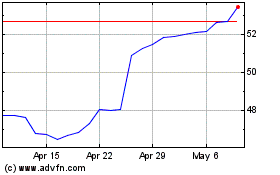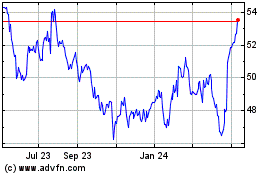Barry Callebaut Turns Bullish on Chocolate Outlook -- 2nd Update
April 06 2016 - 7:02AM
Dow Jones News
By John Revill
ZURICH--Barry Callebaut AG is confident of taking a bigger chunk
of the chocolate market, strengthening its position as the world's
largest supplier now that global demand is showing signs of
recovery.
The Zurich-based company, the maker of the chocolate that goes
into Oreo cookies, is seeing demand stabilize in many markets, said
Chief Executive Antoine de Saint-Affrique.
"The long term forecast for the confectionary market is 1.8%
growth, and we see a stabilization of markets altogether," Mr. de
Saint-Affrique said.
Growth in Barry Callebaut's sales volumes to restaurants as well
as to food, ice-cream and drinks manufacturers like Mondelez
International Inc. and Unilever NV contrast with shrinking global
demand for confectionary, particularly in some emerging
markets.
"The interesting thing is the decline in some ways is slowing
down, or getting better," said Mr. de Saint-Affrique.
The comments followed Barry Callebaut's announcement of a 19%
drop in net profit for the six months to Feb. 29 to 107.9 million
francs ($112.7 million) from a year earlier on a 5.6% fall in
revenue to 3.42 billion francs.
Fiscal first-half sales volumes rose by 4.5%, a contrast with
the 2.6% decline in the global confectionary market measured by
market research company Nielsen.
"In the global confectionary market, volumes are still negative,
but the value is going up," said Mr. de Saint-Affrique. "Six months
ago we were at -5%, so the trend is improving bit by bit."
Mr. Saint-Affrique's bullish outlook cheered up investors, with
Barry Callebaut stock rising more than 6% in early trading in
Zurich.
Barry Callebaut's first-half results would have been better had
it not been for the strong Swiss franc. Revenue rose 12% in local
currencies.
The franc has soared in value over the past year against the
euro since the Swiss central bank scrapped a long-standing limit on
the currency's value early last year. Barry Callebaut said it
suffered a "severe" impact in converting its foreign profit back
into Swiss francs.
Sales growth was also tempered by the company reducing some
sales in the cocoa business, with less profitable contracts phased
out. Mr. de Saint-Affrique said Barry Callebaut would be more
"picky" in future.
Management would also continue to look at bolt-on acquisitions,
particularly of companies that make high-end chocolate used by
chefs for desserts, he said.
Mr. de Saint-Affrique said he expected a "small deficit" in the
cocoa market this season, with demand outstripping supply, but that
it wouldn't threaten the overall supply-demand picture for the
bean, which is largely produced in West Africa.
Dry weather and a strong seasonal harmattan wind, which dries
out cocoa pods, have stoked fears of a shortage in the mid-crop,
the second and smaller of the region's two annual harvests.
"We don't foresee a major structural tension when it comes to
supply," he said.
In February, the International Cocoa Organization also forecast
a cocoa deficit for the 2015-16 season of 113,00 metric tons,
attributing the drop to dry weather in West Africa.
Katherine Dunn contributed to this article.
Write to John Revill at john.revill@wsj.com
(END) Dow Jones Newswires
April 06, 2016 06:47 ET (10:47 GMT)
Copyright (c) 2016 Dow Jones & Company, Inc.
Unilever (NYSE:UL)
Historical Stock Chart
From Mar 2024 to Apr 2024

Unilever (NYSE:UL)
Historical Stock Chart
From Apr 2023 to Apr 2024
